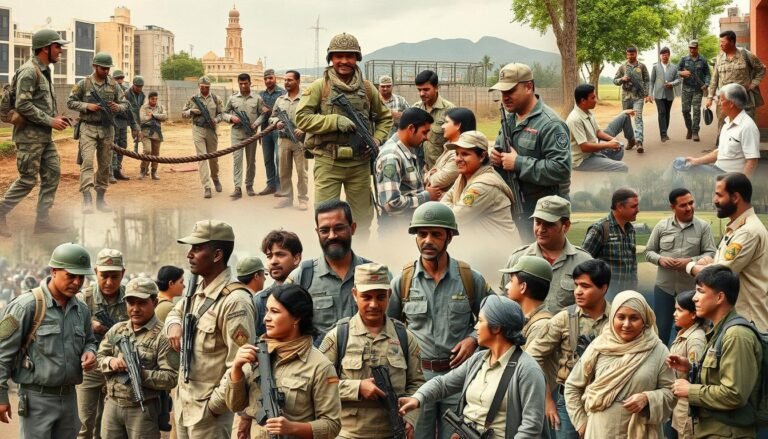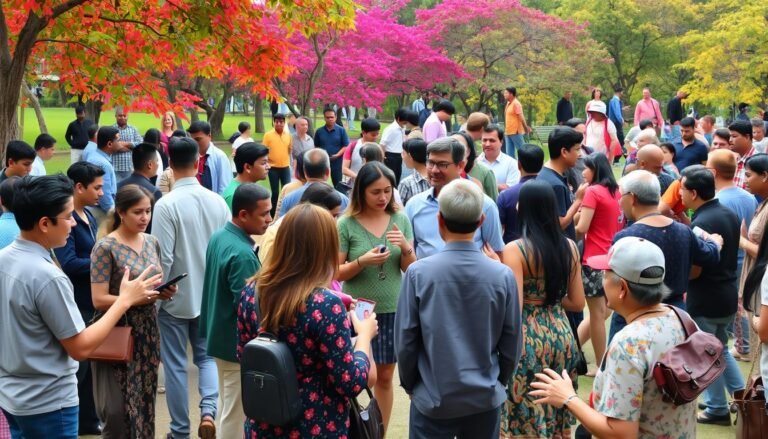Critical Theory in Sociology: Origins and Applications
Can a single school of thought change how we see society and power? The Frankfurt School’s Critical Theory has done just that. It started a revolution in how we think about society that still affects us today.
In the 1930s, Critical Theory was born as a powerful way to analyze society. It wanted to change society, not just study it. Max Horkheimer and Theodor Adorno led this effort. They mixed philosophy with social science to aim for human freedom.
The Frankfurt School gave rise to Critical Theory. It brought together thinkers who challenged the usual ways of thinking. Their work aimed to reveal hidden power structures and challenge our social norms.
Exploring Critical Theory in sociology shows how it has changed our view of power, culture, and change. From its Marxist roots to its effect on research today, Critical Theory offers new views on old issues.
Key Takeaways
- Critical Theory started at the Frankfurt School in the 1930s
- It aims to both critique and change society
- Key figures include Max Horkheimer and Theodor Adorno
- Critical Theory combines philosophy and social science
- It focuses on exposing hidden forms of domination
- The approach has greatly influenced modern sociology
Introduction to Critical Theory
Critical Theory changed how we see society and its changes. It started in 1923 at the Frankfurt School. This mix of philosophy and social science aims to challenge power.
Definition and Core Principles
At its core, Critical Theory wants to free people from oppression. It looks at society through various lenses, seeking to free us with knowledge and action. It attacks capitalism and mass culture, showing how power is hidden.
Historical Context and Emergence
The Frankfurt School was created with a donation from Felix Weil. But, the Nazis closed it in 1933. It moved to Columbia University in New York, spreading its ideas worldwide.
| Generation | Key Figures | Contributions |
|---|---|---|
| First | Max Horkheimer, Theodor Adorno | Critique of modernity, capitalist society |
| Second | Jürgen Habermas | Global influence, academic dialogue |
| Third | Andrew Feenberg, Axel Honneth | Contemporary applications |
Significance in Sociological Thought
Critical Theory has deeply influenced sociology. It brought new ways of thinking, challenging old methods. By mixing psychoanalysis and Marxism, it offers a fresh view on social issues.
This view continues to guide today’s sociology, focusing on power and change.
“Critical Theory combines philosophy, social science, and practical aims for emancipation, providing an encompassing interpretation of social reality as a whole.” – Max Horkheimer
The Frankfurt School: Birthplace of Critical Theory
The Frankfurt School started in 1923 at Goethe University Frankfurt. It was the beginning of Critical Theory. This group aimed to change social theory and tackle the political issues of the 20th century.
Key Figures and Their Contributions
Max Horkheimer, Theodor Adorno, Herbert Marcuse, and Walter Benjamin were key thinkers of the Frankfurt School. Horkheimer worked on making critical theory clear. Adorno looked at how society is affected by the culture industry. Marcuse studied the roots of totalitarianism, and Benjamin analyzed culture.
Influence of Marxism and Psychoanalysis
The Frankfurt School was deeply influenced by Marxist philosophy and psychoanalysis. They used these ideas to study the reactionary economics of 20th-century Europe. By the 1950s, their work was widely recognized, affecting sociology, philosophy, and cultural studies.
Development of Interdisciplinary Approach
The School took a unique approach by mixing philosophy, sociology, psychology, and cultural analysis. This blend helped them understand how ideologies affect people and sometimes lead them to support extreme ideologies like Nazism.
| Aspect | Frankfurt School Approach |
|---|---|
| Goal | Transformation of society |
| Focus | Challenging status quo |
| Key Concepts | Alienation, reification |
| Method | Interdisciplinary analysis |
The Frankfurt School’s ideas still influence critical thinking in sociology and other fields. They encourage us to question our current systems and work towards change.
Theoretical Foundations of Critical Theory
Critical Theory started with the Left Hegelians and Karl Marx. It’s based on Marx’s idea that history and society are shaped by material things. The goal is to understand how to be free and how society affects philosophy.
The Frankfurt School updated Marxism for today’s capitalist world. They added insights from psychoanalysis and other areas. This created new ways to see social conflicts and human actions.
Critical Theory is all about changing society for the better. It studies power structures and how to change them. It’s not just about studying society. It’s about uncovering hidden controls and pushing for change.
“The philosophers have only interpreted the world in various ways; the point, however, is to change it.” – Karl Marx
The Frankfurt School has influenced many thinkers over the years. They’ve built on Marx’s ideas about materialism and change. Their aim is to make society more just and equal.
| Generation | Key Figures | Main Contributions |
|---|---|---|
| First | Max Horkheimer, Theodor Adorno | Critique of mass culture, authoritarian personality |
| Second | Jürgen Habermas | Theory of communicative action |
| Third | Axel Honneth | Recognition theory |
Critical Theory in Sociology: Origins and Applications
Critical Theory changed sociology, offering new ways to see social conflicts and culture. It brought together psychology and sociology for a deeper look at society.
Early Sociological Implementations
At first, Critical Theory looked at how capitalism affects society and people. Sociologists used it to understand social issues better. This view went deeper than just the surface.
Critique of Traditional Sociological Methods
Critical Theory questioned old ways of studying society. It argued for looking at power and hidden rules in society. This changed how sociologists study and understand social issues.
Expanding Sociological Perspectives
Adding Critical Theory made sociology broader. It mixed philosophy with social research for a fuller view of society. This helped sociologists explore deeper into inequality and power.
- Critical Theory looks at social conflicts from different sides
- It adds psychological insights to sociology
- Cultural analysis gets more detailed with Critical Theory
Critical Theory in sociology gives us a deep, detailed way to understand our social world. It keeps pushing sociology to be more complete and inclusive.
The Concept of Emancipatory Knowledge
Emancipatory knowledge is key to Critical Theory. It helps free people from social structures that keep them down. This idea started in 1937 with Max Horkheimer at the Frankfurt School of Sociology. It grew popular in the 1960s thanks to thinkers like Juergen Habermas, Michel Foucault, and Paulo Freire.
Habermas played a big role in Critical Theory. He divided knowledge into three types: Work, Practical, and Emancipatory. Emancipatory knowledge is about understanding yourself and your past to escape from what limits you. It’s similar to Karl Marx’s view on ideology but doesn’t predict what will happen next.
Critical Theory aims for social change and human freedom by questioning power and culture. It shows how power and assumptions limit our freedom. By exposing these hidden forces, people can learn how to free themselves and society.
“Emancipatory knowledge involves self-reflection and understanding one’s history to emancipate from limiting forces.”
Emancipatory knowledge has touched many areas, like feminist theory, psychoanalysis, and action research. It keeps shaping how we think about society and how to be free.
Critical Theory and Power Structures
Critical theory looks closely at society’s power structures. It uncovers social stratification and questions the current state of things. This view comes from the Frankfurt School and shows how power affects our world.
Analysis of Social Hierarchies
Critical theorists study social hierarchies to show how they keep inequality going. They look at how power is spread and kept, especially among those who are left out. For example, during the COVID-19 crisis, domestic violence cases went up by 32.5%, showing how power imbalances affect us.
Critique of Capitalism and Mass Culture
Another big part of critical theory is its look at capitalism. It wonders how the economy affects our social lives and cultural values. The theory says mass culture often helps keep power structures in place, making sure some groups stay on top. Now, 2.3% of social work studies use critical theory to understand this better.
Exposing Hidden Forms of Domination
Critical theory tries to reveal the hidden ways society controls us. It looks at laws, rules, and ideas that can be oppressive. For instance, a study found that people with disabilities face a 1:1.5 gap in healthcare access because of neoliberal policies, showing deep-seated inequalities.
| Critical Theory Focus | Percentage in Articles |
|---|---|
| Critical global health | 1.1% |
| Foundations of critical theory | 0.7% |
| Critical race theory | 0.5% |
Cultural Criticism and Ideology Critique
Critical theory highlights the hidden forces that shape our society. It looks closely at how mass media and the cultural industry shape our thoughts and beliefs. This shows how powerful groups use culture to keep control.
The idea of false consciousness is central to this view. It says many people believe things that actually work against their own best interests. These beliefs often come from what we see in movies, TV shows, and ads.
- The idea of ideology dates back to the French Revolution
- Critical theory stems from the Frankfurt School in Germany
- Herbert Marcuse, a key thinker, argued for “repressive tolerance” in society
Critical theorists use different methods to reveal hidden power structures. They often use qualitative research like discourse analysis and ethnography. These tools help show the subtle ways domination affects our daily lives.
| Aspect | Traditional View | Critical Theory View |
|---|---|---|
| Media | Information source | Tool for ideology |
| Culture | Shared values | Mechanism of control |
| Consciousness | Individual choice | Socially shaped |
Cultural criticism makes us question what we often take for granted. It challenges us to think deeply about the messages we receive and the beliefs we hold.
Critical Theory’s Impact on Modern Sociology
Critical theory has changed the way we think about sociology today. It has made research methods better and started new conversations. This approach brings together different fields and new ways of thinking, making sociology more complete.
Influence on Research Methodologies
Critical theory has changed how sociologists do their research. It looks at things from a wider perspective, combining insights from many areas. This has led to new ways of studying that go beyond just numbers.
Shaping Contemporary Sociological Discourse
Critical theory has had a big effect on sociology today. It has led to talks about power, culture, and unfairness in society. These discussions have made sociology richer, helping us tackle big issues better.
Integration with Other Critical Approaches
Critical theory has teamed up with other critical views in sociology. This mix has created new ways to understand society. By combining with feminist, race, and postcolonial studies, sociologists now have more tools to analyze social issues.
| Approach | Focus Area | Impact on Sociology |
|---|---|---|
| Critical Theory | Power structures, ideology | Encourages questioning of social norms |
| Feminist Theory | Gender inequalities | Highlights gender-based power dynamics |
| Critical Race Theory | Racial disparities | Examines systemic racism in institutions |
| Postcolonial Studies | Global power relations | Analyzes cultural and economic imperialism |
Applications in Various Sociological Subfields
Critical Theory has made a big impact in many areas of sociology. It helps us understand and challenge gender inequalities in gender studies. By looking at how society and its institutions keep gender roles in place, researchers can spot and fight these inequalities.
Race theory also benefits from Critical Theory. It helps us see how racism affects society and its institutions. By digging into the past and looking at power, researchers can explain why racial inequalities still exist today.
Postcolonial studies use Critical Theory to study the effects of colonialism. They look at how colonialism affects society, culture, and the economy even after it’s over. Researchers focus on how colonial history shapes our identities and cultures today.
Using Critical Theory has brought new ideas and ways of studying these areas. For example, in gender studies, it helps us see how gender, race, class, and sexuality work together to affect people’s lives. In race theory, it has introduced ideas like microaggressions and how racism works in institutions.
| Subfield | Key Focus Areas | Critical Theory Contributions |
|---|---|---|
| Gender Studies | Patriarchal structures, gender roles | Intersectionality, challenging gender norms |
| Race Theory | Systemic racism, racial inequalities | Institutional racism, critical race theory |
| Postcolonial Studies | Colonial legacies, cultural hybridity | Subaltern studies, decolonization theories |
Challenges and Criticisms of Critical Theory
Critical Theory is a big deal in sociology, but it has its problems. Scholars have raised methodological critiques and started theoretical debates. They say the theory’s focus on norms can make it less scientific and more biased.
Accusations of Subjectivity and Bias
The Frankfurt School’s critical approach has made some wonder about its objectivity. Critics believe its focus on power and social order might influence results too much. This could make the research less reliable.
Limitations in Practical Application
Using Critical Theory in real life is hard. It’s great at spotting problems but struggles to offer solutions. This gap between theory and action is a big topic of debate.
| Aspect | Criticism | Impact |
|---|---|---|
| Objectivity | Lack of scientific neutrality | Questionable research validity |
| Practicality | Limited real-world applications | Reduced policy influence |
| Methodology | Overemphasis on critique | Insufficient solution-oriented research |
Responses from Critical Theorists
Critical theorists have spoken up to these issues. They’ve worked hard to improve their methods, tackling bias and practical issues. This ongoing conversation helps shape Critical Theory in sociology.
Even with its flaws, Critical Theory is still key in sociology. It keeps evolving to fix its problems while keeping its main goal of critiquing society and freeing people.
Conclusion
Critical Theory has had a big impact on sociology, shaping how we do research and talk about things since it started. From Max Horkheimer’s “Kritische Theorie” in 1968 to Michael J. Thomson’s 2016 work, it has grown and kept its main ideas. It still helps us understand today’s big issues, like how capitalism affects us and new kinds of social inequality.
This theory mixes philosophy, sociology, and psychology in a special way. Eric Fromm’s idea of “pathological normalcy” and Herbert Marcuse’s “repressive desublimation” give us strong ways to look at today’s complex society. These ideas, along with the theory’s history, make a strong way to see and judge social structures.
Looking ahead, Critical Theory is ready to face global problems and how technology changes society. The idea of blending Fromm and Marcuse’s thoughts in “Critical Theory and Social Pathology” shows promising new paths. As society changes, Critical Theory will too, keeping it important for dealing with our fast-changing world.
Source Links
- Critical theory
- Critical Theory (Frankfurt School)
- Understanding Critical Theory
- Frankfurt School and Critical Theory
- Frankfurt School
- Critical Theory | Reflections & Notes
- Frankfurt School – Routledge Encyclopedia of Philosophy
- Theoretical Perspectives
- Critical Theory, Culture Change, and Achieving Health Equity in Health Care Settings
- No title found
- The Relationship Between Critical Social Theory and Interpretive Description in Nursing Research
- The Critical Theory of Jurgen Habermas
- Critical Theory in Sociology: Examples, Definition, Critique
- Critical Theory
- A brief reflection on the issue of science, ideology and critical theory
- Understanding and Challenging Social Inequality: An Introduction to Critical Theory
- An Exploration of the Impact of Critical Theory on Modern Social, Political, and Cultural Thought
- Critical Theory and the Crisis of Social Theory by Douglas Kellner
- 1.3 Theoretical Perspectives in Sociology – Introduction to Sociology 3e | OpenStax
- 5 Examples of How Sociology Impacts Everyday Life | JWU CPS
- Sociology
- Critical Theory
- ‘Critical Theory and Social Pathology: The Frankfurt School Beyond Recognition’ by Neal Harris reviewed by Owen Brown







